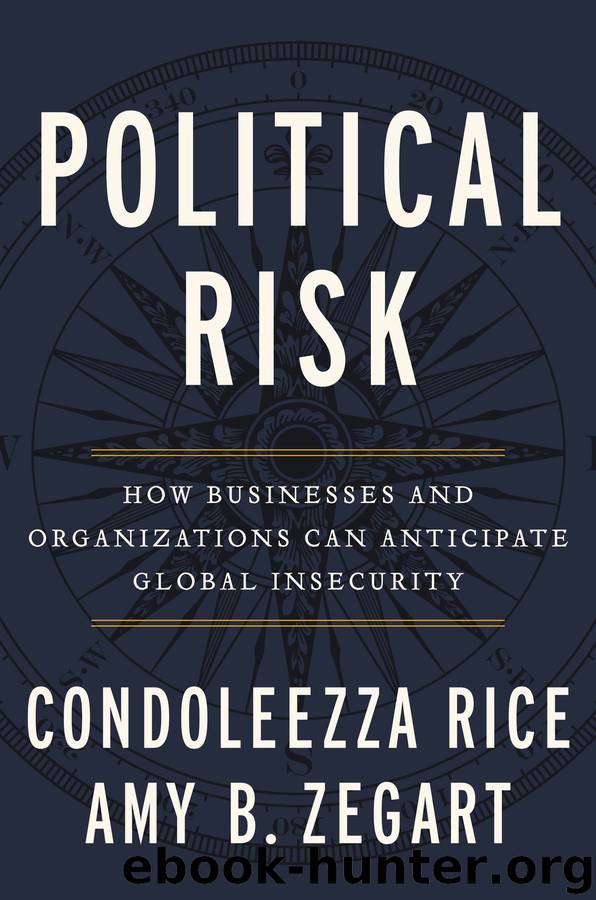Political Risk by Condoleezza Rice

Author:Condoleezza Rice
Language: eng
Format: epub
Publisher: Grand Central Publishing
Published: 2018-10-02T04:00:00+00:00
Rule 2: Good information includes perception and emotion.
Good information also provides insight about perception and emotion. Perception and emotion are tightly intertwined drivers of human behavior, whether it’s consumers in department stores, protesters on streets, or lawmakers in Congress.
Perhaps no episode in Condi’s government service illustrates the power of perception and emotion better than the Dubai Ports World controversy. She taught this case to all incoming MBA students for several years. Here’s what happened.14
In 2006, Dubai Ports World, an award-winning port management company owned by the government of the United Arab Emirates, acquired the London-based Peninsular and Oriental Steam Navigation Company (P&O), one of the world’s oldest and largest port operators. The $6.8 billion deal made Dubai Ports World the fourth-largest container port operator (by throughput) in the world, with terminals in the Middle East, Europe, Asia, Australia, Latin America, and the United States. Because the acquisition gave Dubai Ports World control over operating container terminals in six U.S. ports (Baltimore, Miami, New Orleans, New York, New Jersey, and Philadelphia), it needed to be approved by the Committee on Foreign Investment in the United States (CFIUS), a federal interagency panel charged with reviewing the national security implications of transactions granting foreign control over U.S. businesses. At the time, twelve government agencies were represented on CFIUS, including the National Security Council and the Departments of Defense, Homeland Security, State, and Justice.
The approval process began smoothly. Foreign operation of shipping terminals in the United States was in fact common: Seventy-five percent of shipping at the time passed through terminals leased by foreign companies.15 Security at American ports was the primary responsibility of the Coast Guard, not terminal operators. What’s more, the CFIUS review found no specific cause for concern. The Department of Homeland Security found Dubai Ports World to be fully cooperative with the mission of protecting American ports and American ships in foreign ports. The UAE was a longtime American ally and partner in the war on terror. In fact, UAE ports hosted more U.S. Navy ships than any port outside the United States. In addition, the UAE was providing valuable assistance to American missions in both Iraq and Afghanistan, and the government had played an instrumental role in arresting Abd al-Rahim al-Nashiri, the suspected mastermind of the USS Cole bombing (which killed seventeen American sailors) and the 1998 U.S. embassy bombings in Kenya and Tanzania.
On paper, everything looked good. CFIUS unanimously approved the deal.
But perception and emotion were quite another matter. Just four years after 9/11, fears of terrorist attacks on the U.S. homeland remained acute. The prospect of allowing an Arab government to operate shipping terminals in American ports sparked concern and outrage in Congress. The UAE was an Arab country, one of only three nations that recognized the Taliban regime in Afghanistan before 9/11, home to two of the 9/11 hijackers, and the place where financial transactions supporting the attack appeared to have occurred.16 The Dubai Ports World deal quickly came under fire. Opposition was visceral, bipartisan, and widespread.
Download
This site does not store any files on its server. We only index and link to content provided by other sites. Please contact the content providers to delete copyright contents if any and email us, we'll remove relevant links or contents immediately.
| Anthropology | Archaeology |
| Philosophy | Politics & Government |
| Social Sciences | Sociology |
| Women's Studies |
The Secret History by Donna Tartt(19088)
The Social Justice Warrior Handbook by Lisa De Pasquale(12190)
Thirteen Reasons Why by Jay Asher(8910)
This Is How You Lose Her by Junot Diaz(6887)
Weapons of Math Destruction by Cathy O'Neil(6280)
Zero to One by Peter Thiel(5802)
Beartown by Fredrik Backman(5754)
The Myth of the Strong Leader by Archie Brown(5508)
The Fire Next Time by James Baldwin(5446)
How Democracies Die by Steven Levitsky & Daniel Ziblatt(5219)
Promise Me, Dad by Joe Biden(5153)
Stone's Rules by Roger Stone(5088)
A Higher Loyalty: Truth, Lies, and Leadership by James Comey(4964)
100 Deadly Skills by Clint Emerson(4925)
Rise and Kill First by Ronen Bergman(4789)
Secrecy World by Jake Bernstein(4753)
The David Icke Guide to the Global Conspiracy (and how to end it) by David Icke(4720)
The Farm by Tom Rob Smith(4513)
The Doomsday Machine by Daniel Ellsberg(4490)
